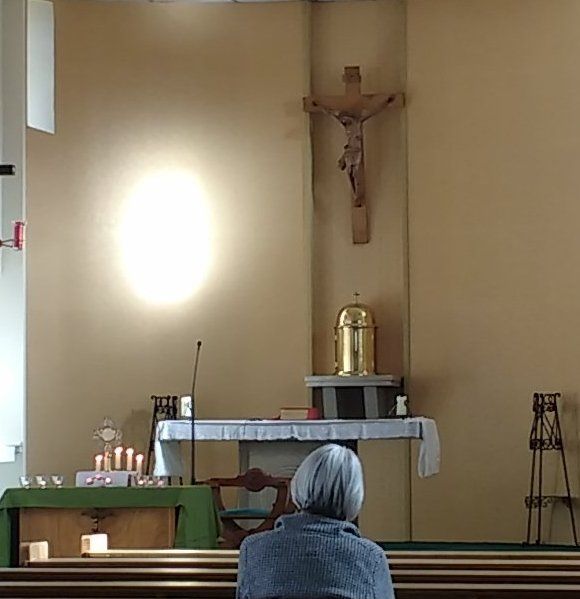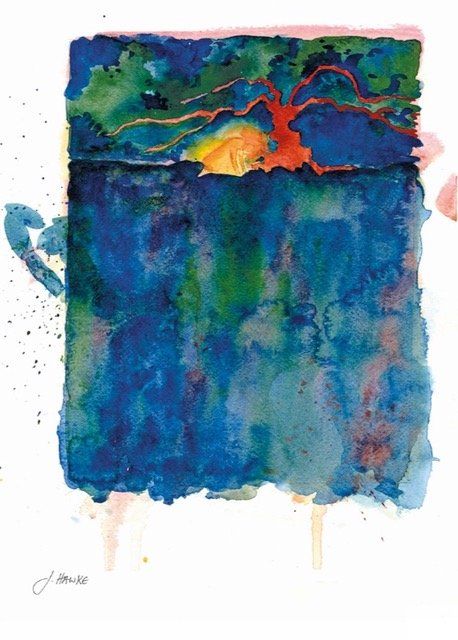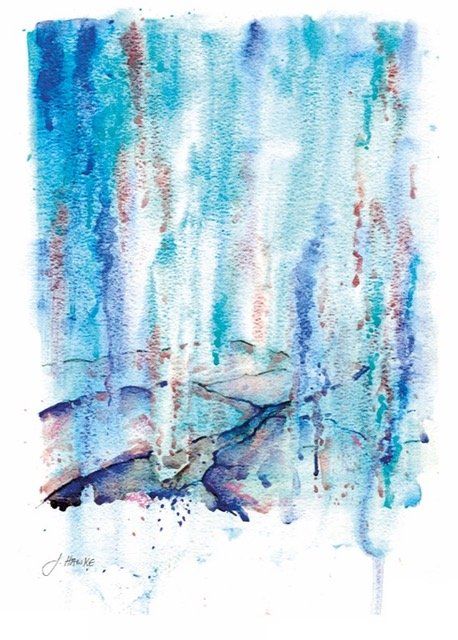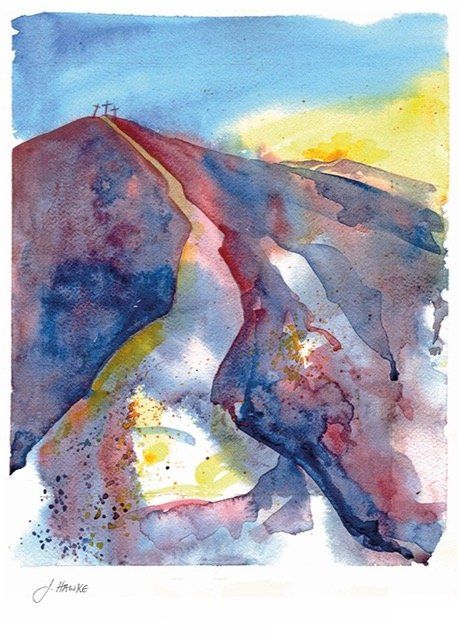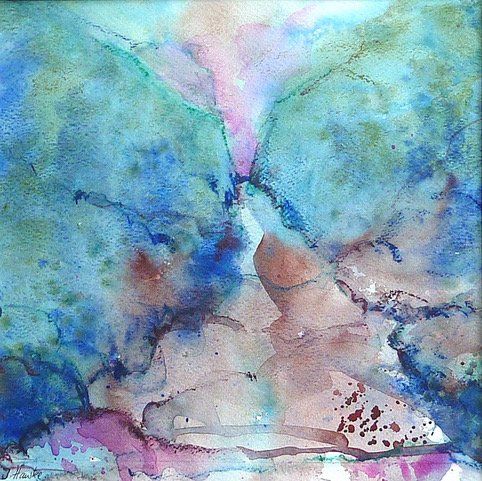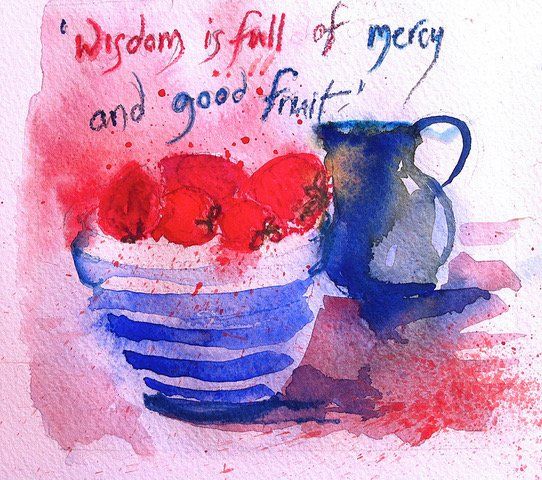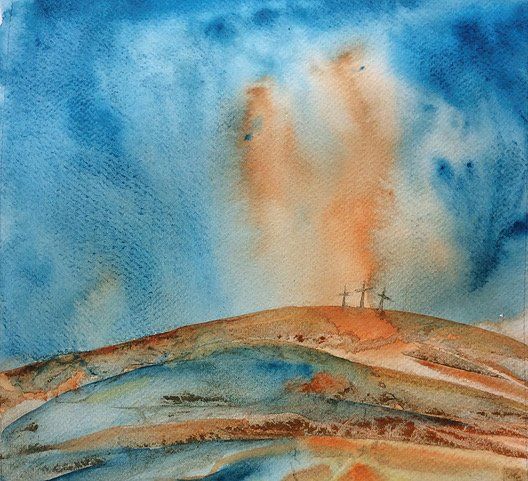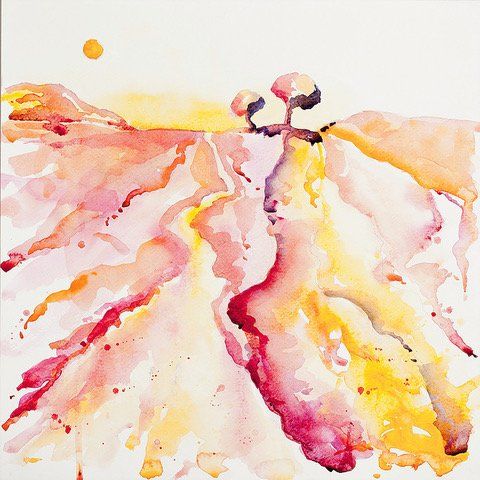Prayer afternoon at St John Vianney's
Sunday 10th March in St John Vianney's Church from 2pm - 5pm
Prayer is the cornerstone
of all that we are seeking to achieve.
We had a beautifully prayerful afternoon with music, images and reflections to help us deepen our relationship with God so that we might know his will for us as missionary disciples.
The paintings are by Jenny Hawke and her website is:
The reflections are adapted from
Journeying with Jesus by Denis McBride
1) Into the wilderness
Few of us would want the wilderness as our regular address. We prefer the familiar territory of our comfort zones where we are in charge and can remain within the predictable rhythm of the familiar without being threatened or tempted. Sooner or later, however, we all find ourselves thrown into some sort of wilderness, within or without.
Some of us are thrown into the wilderness not by our own choosing but when our lives without notice, are interrupted and we are suddenly faced with huge loss: a collapsed marriage, a lost love financial disaster, sudden addiction. Sometime wilderness is feeling utterly alone and unsupported, feeling abandoned by God. Our prayers can become the lament of the God-forsaken: “My God, my God, why have you abandoned me?”.
We ask, why did God allow this tragedy to happen to me? What did I do to deserve this? Its at times like these when we realise that we are not in control of our lives: we are no longer making things happen; rather things are happening to us. And it’s here, in the wilderness, that we search out ourselves and God. And we have to wait. Waiting can be its own Wilderness.
PRAYER
WE pray for all those who are powerless to influence their own future;
for all those who are oppressed
in body in mind or in spirit.
That whatever forces lead them
to the crippling place they now live,
the spirit might lead them
out of their address in the wasteland
and give them the courage and strength
to shape their lives anew.
We pray for ourselves:
that the Lord will be our strength In time of temptation
And guide us in the way of truth
We ask this in the name of Jesus Christ our Lord Amen
2) At the Well: Connecting with people
What do you say after you say “Hello” More basically, some people might ask, “How do you get to say hello to some people?” In a world where difference can often be seen as oddness and where distinctness can be registered at estrangement, how do you go beyond the usual suspects and reach people totally different from you? The point about other people is that they are other. How do you devise a way of connecting with them, so that a conversation can begin? Or do you remain within the boundaries of your own limited world connecting only with your “ain folk”?
The woman of Samaria goes to the well out of hours, she discovers a man there, the wrong kind of man sadly, since he is a Jew, she instinctively tries to disconnect the conversation with him he is too other. Some conversations are primed to go nowhere, marked as nonstarters because of the conflicting background of the speakers and the weight of inherited prejudice. This exchange appears to be one of them but the man, Jesus, isn’t going to let that happen here, he has other things in mind for the “woman at the well”.
PRAYER
We pray for all who are marginalised in life,
for all who are excluded because of their race,
their religion, or their gender:
that they might know the loving embrace of the Lord
Who offers them living water.
We pray for all minorities in every land
who struggle to maintain their own customs
and safeguard their traditional lands
that we might see them as a blessing not a threat;
a gift to us and the nation, not an embarrassment.
This we ask through Jesus Christ our Lord Amen
3) On the Mountain: Going beyond appearances
In the parable of the last judgement in Matthew 25, we learn that just as we all have the capacity to disfigured people— by ignoring them —we also have the capacity to transform them— by attending to them— Matthew introduces us to different groups— the hungry, the thirsty, the naked, the estranged, the sick and the imprisoned —a litany of people defined by their hardship or destitution, all longing for others to attend to their plight and transform them with mercy and kindness.
The people who are welcomed into the fullness of the kingdom are not superstars who have performed spiritual heroics, but ordinary folk who have paid attention to the plight of their brothers and sisters. The Blessed are commended for their actions not their attitudes; for what they did, not for what they thought. Their response was humane and therefore profoundly religious; it is hallowed as the kingdom response of those who take responsibility for a broken world. They inherit a kingdom because they paid attention and transfigured others by their kindness.
Throughout his ministry Jesus is seen to transfigure people liberating them from a world where their deformity or offence defines who they are. And the day comes when Jesus is transfigured himself by the Father who loves him..
PRAYER
We pray for all those who feel defeated by life,
who believe that life has somehow passed them by;
we pray for all who are disfigured or scarred
in body, in mind, or in spirit;
for all those who are named and known
by their affliction or offence.
We pray for ourselves
that we might never undervalue
the power of love and compassion;
that we might welcome all who need human love and fellowship
Including the little people in life
who hunger and thirst to be noticed and counted.
We ask this through Jesus Christ our Lord Amen
4) Along the Road: A church of pioneers and settlers
When we think about ourselves, do we see ourselves as pioneers or settlers? Which is more important: freedom of security? Horizon or Homestead? Do we want to map out new ways or are we happy staying put where we are?
The church is made up of both kinds of people. The apostle Paul: a tent maker who spent his life travelling around as a preacher, or the apostle James, the head of the church in Jerusalem and the brother of the Lord, who stayed around to build up the local community. The apostles Paul and James did not get on particularly well, but every community needs both kinds: people who call the community away from stagnation, and people who build up the community.
We pray that the church will attract people of a pioneering spirit, who will carry the word to distant places and cultures. We pray that each one of us be given the grace and courage to be missionary disciples to grow our church from a maintenance church to a missionary church. We pray especially for our leadership team that they will be guided by the Holy Spirit as they map out new ways of being church and refine/plan/ develop our cluster vision statement.
PRAYER
We pray for all who have had to quit home because they were excluded and rejected; for all who leave home as economic migrants.
We pray for all who are fleeing from danger or who are homeless and hungry and cold. We pray for young people who are lost; and those who have left or run away from home, that they will arrive safely at the place where they long to be.
We pray that all who come to our community will be welcomed, the stranger, the refugee, the outcast: that they might know and receive our love and generosity and be truly blessed, and that we in turn will be blessed because we have ministered to the hidden Christ in our midst.
We ask this through our Lord Jesus Christ Amen.
5) At table
At the Last Supper we see the common struggles of community in the making. And just as the apostles were confused and uncertain about what was going on, that same drama can be repeated at our own Eucharist. But the good news is that Jesus can live with that. At the Last Supper Jesus broke bread for his broken community: he was breaking bread not for an assembly of heroes but for a fragile, confused group of followers. The Eucharist is always bread broken for broken people. Jesus keeps telling us that our fragile humanity does not have to be denied or disguised to be accepted; rather in its fragility, in its shaky beauty, it is uplifted and transformed in the love of Christ.
The night before his death Jesus said these haunting words: “Remember me”. When I have gone, remember me; do this in memory of me. Eat the memory; feed off it. Remember my love. Remember it by doing it. This we do when we celebrate the Eucharist. But we hope for more: that we will not only be consumers of the bread of life but that we will become bread, bread for each other; that we will be a cup of salvation for one another. That is the best way to keep the memory of Jesus alive in our midst.
PRAYER
We pray for all who are never invited to celebrations;
For those who are for ever overlooked and bypassed and who feel wholly unwanted.
That the Lord might open our eyes and enlighten our minds
to extend a welcome that will give new life to the neglected
Lord look upon us with kindness and kindle in us the fire of your love
that we may never be insensitive to the pain and the needs of others,
And see that everything we have is gift to be shared.
This we ask in the name of Jesus Christ, our Lord. Amen
6) On the cross
Did Jesus have to die on the cross?
Could Jesus have avoided the cross?
Could he have made a detour around Golgotha and returned to the quiet district of Galilee? Could he have avoided execution and settled for a quiet existence by the shores of the northern lake? Did his way of being human demand the cross.?
It was not Jesus who looked for the cross; it was others in authority that looked to the cross as a way to eliminate him. It was not the idea of the Father:
God is not a sadist who planned the destruction of Jesus.
George McCauley, a Jesuit, put it strongly when he wrote “We cannot have God planning Jesus’s death in any sense if God plans anything, it is that Jesus (God incarnate) share in solidarity our human condition”.
Love did not demand the cross, but in the life of Jesus love ends up on the cross. That is, often, what continues to happen to self forgetful love. Love chooses not to avoid the suffering that emerges from its commitment.
The cross of Jesus stands at the centre of the Christian story as the sign of the lengths love will go to In its passion for others. The cross is lifted up in the midst of the Christian community as a sign that someone thought we were worth all the pain and the suffering. The love of one who “did not clinging to his equality with God but emptied himself” to become as we all are; and, as we are, to show us that in spite of our stupidities and the madness, God loves us. All else is, commentary.
PRAYER
We pray for all who suffer in the cause of the right, for those who give their lives for a purpose larger than their own safety and survival. That their generosity of spirit might meet its own reward in the fullness of life.
We pray for those who mourn the loss of loved ones, that their sorrow might be free from hopeless grief and bitter regrets.
May the Lord fill us with compassion for those we know who mourn, and inspire us to offer them comfort and support.
We ask this through Jesus Christ our Lord, Amen
7) On the road again
The road to Emmaus.
The disciples look on the death of Jesus as many probably did as the end of a promising calling, not the fulfilment of a promised one.
There is a sense in which we can see the two disciples on the road to Emmaus as our contemporaries, fellow travellers journeying through a grey landscape of ambiguity and disappointment, where in the uncertain light of what is seen and sensed, so many cherished hopes, now withered, have been relegated to lost causes.
Yet the story of their loss is what we call Gospel, what we name as scripture. When their story is proclaimed at Mass, the priest adds the words, “This is the gospel of the Lord”. What the disciples saw as hopeless we interpret as good news, not least because we interpret their story in the larger frame of scripture. And that is what the risen Jesus does in response to his two disciples on the road to Emmaus.
The two disciples openly share their disappointment and loss on the road; they do not disguise how they see things; they tell the story of how they have lost their dreams and their hopes. They are joined by Jesus who listened to them and opens their minds to a larger perspective than their limited experience. In going to table, in the breaking of the bread the disciples meet the one they thought had gone for ever. That experience enlivens them to take the road back to Jerusalem and share their new experience with their companions.
PRAYER
We pray for our own community that our churches maybe places of welcome,compassion and care, where the sorrowing find comfort, where the lonely find fellowship where the faithful find grace. Above all may our churches be places of love and respect where each person is recognised and reverenced as a child of the living God.
